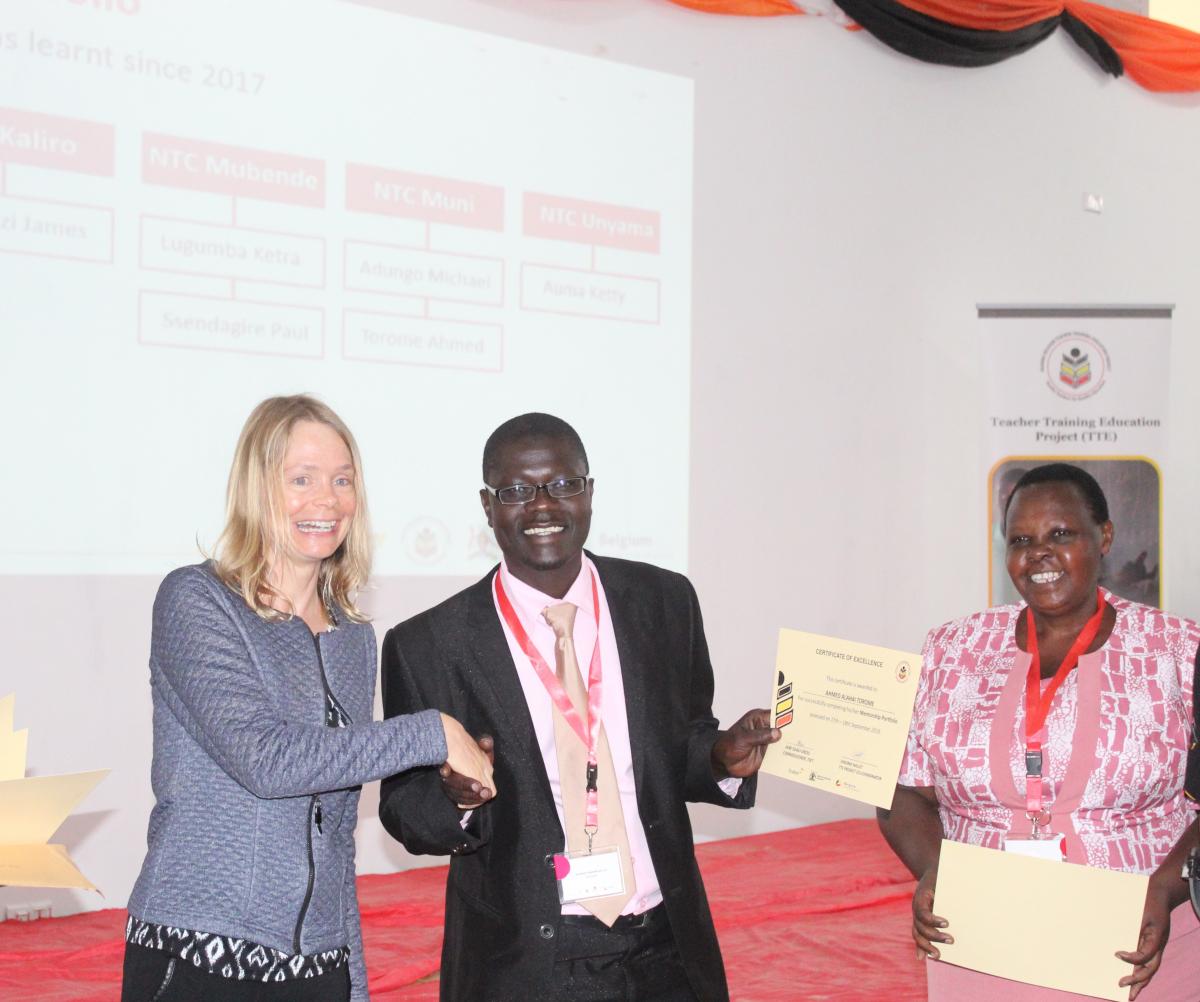Supporting the Teaching Profession in the National Teachers' Colleges
“While we are always quick
to recognise education as the driving force for development in any country, we
need to ask ourselves in our different capacities, (as ministers, as technical officers,
as leaders, parents and students) an important question. Is education possible
without teachers?”
Rudi Veestraeten, Belgium Ambassador to Uganda.
Simply put, teachers are the most important agents of change in
the education process. Their role is one that cannot be over-emphasized because
it stretches beyond their obligation and responsibility to pass on information to
one that directly or indirectly influences the lives of students. Whether this
in a classroom during the early stages of education or in a lecture hall at
tertiary institutions, their role is central to the education process.
Therefore, for students to learn and obtain the best education they need more
than just books and resources, they need qualified teachers.
It is with this in mind, that Enabel in partnership with the
Ministry of Education and Sports set out to improve the quality of education in
Uganda, with a focus on teachers through the Teacher Training Education (TTE)
project. This project majorly focuses on improving secondary teacher education
in the National Teachers’ Colleges (NTCs) of Mubende, Muni, Kabale, Kaliro and
Unyama.
Improving
the Profession
In the days leading up to the National teacher day celebrations,
the Teacher Training Education project organised a separate event on 2nd
October hosted by NTC Kabale. This event brought together a diverse group of
stakeholders from the Ministries, Uganda National Teachers’ Union (UNATU),
Teacher colleges and education development partners to honour the
contribution of teachers from the National Teachers’ Colleges to the education
process.
Under the global theme ‘Young
teachers: The Future of the Profession’, the event tackled several objectives
namely: presenting the impact of the National Teacher Policy on secondary
teacher education, showcasing new in innovations that can improve teacher
education, advocating for the needs of the NTCs and recognizing and honouring
outstanding NTC staff.
While the act of teaching may be considered as a highly rewarding
process, the teaching profession is not without its challenges. During his speech, H.E Rudi Veestraeten, the
Ambassador of Belgium highlighted several challenges affecting teachers in
Uganda today. Among these was the low salaries, limited scope for career
development and poor infrastructure. He, however, called upon all stakeholders to
make more efforts to retain the young talents and brightest minds within the
profession.
In an attempt to address the needs and challenges that teachers
face today, two advocacy points were raised during the teacher’s day
celebration. One was the need to shift the focus from theory to practice.
Dubbed as “Practice Makes Perfect”, the project showcased an innovation
called the Continuous School Practise (CSP) Pilot system that is currently
running in the five National Teachers’ Colleges. This pilot system provides
young pre-service teachers with the opportunity to acquire hands-on teaching
skills and practice new learner-centred teaching methodologies in an actual
classroom. Among the other innovations in this area, is the online education
platform on revised and modernized general teaching methods course that is
currently under development. This online course provides easy and free learning
resources to NTC in-service teachers ‘anytime and anywhere’, an aspect that can
greatly improve access to education.
The second advocacy point raised, focussed on closing staff gaps
in the NTCs. This stemmed from the human resource challenges that the current
establishment could not fulfil. The existing structure of the NTCs operates
with staff gaps such as ICT managers, procurement officers, laboratory
technicians among others, which limit the operational capacity of the colleges.
Addressing these issues provided a grand opportunity for
stakeholders to support teachers in the NTCs to deliver to the best of their
ability and prepare them to teach in the 21st century. Kyambogo
University the examination body of the NTCs committed to reviewing the college
curriculum to include Continuous School Practices (CSP), Active Teaching and
Learning (ATL) methodologies, ICT and gender-responsive pedagogy. The Ministry
of Education and Sports committed to providing demonstration schools attached
to the NTCs for better teaching practice, recognising the use of mentors to
strengthen pedagogical support and allocating a budget for CSP. The Ministry of
Public Service, on the other hand, committed to fulfilling all the positions in
the NTC establishment with a gender-based approach.
This event also saw both the teaching and
non-teaching staff awarded for their outstanding performance and service in the
institutions.
The Teacher Training Education (TTE) Project places massive focus
on three key areas of Institutional development, Infrastructure and Pedagogy,
which when combined contribute to improving the quality of education in the National
Teachers’ Colleges.
Latest news from this project
No news

